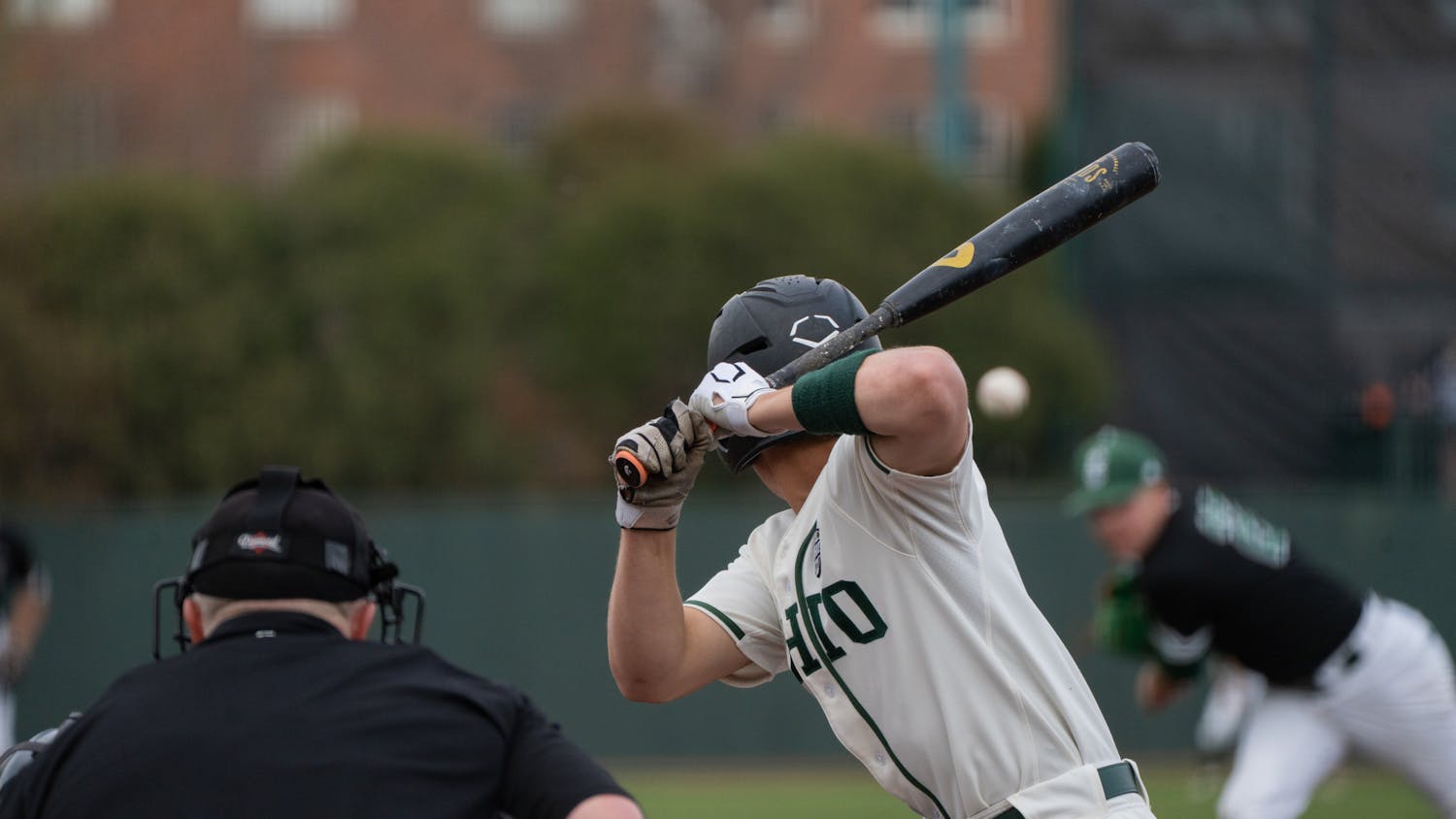Dak Notestine paced around midfield at Peden Stadium with a whistle hanging from the bottom of his lip.
Practice had just ended, and while the players were anxious to escape the unseasonably high temperatures, there was still one thing left they had to do.
Donning aviator sunglasses and a sleeveless black Ohio T-shirt, he curled the whistle tighter into his lips and blew. Then, he shouted over the conversations of players about which stretch was first.
After his yell, the whistle dropped, and he started making small talk with defensive lineman Cole Baker. The brief exchange caused the just recent intense Notestine to break into almost uncontrollable laughter.
As Ohio’s director of strength and conditioning, that’s all just part of the job and the only period where he works with the whole team in one spot on a daily basis.
Being around the players and in the program isn’t just Notestine’s job, but part of his identity from the day he was born.
His father played for Ohio back in the 1970s, and his uncle was a university employee and lived on E. State Street for a number of years.
Notestine’s a Bellefontaine native, and he’s always considered Athens home. The effects of living in a small town — Bellefontaine has a population of 13,370 — haven’t left Notestine.
He was raised in a home where everything you wanted had to be earned. There were no handouts. That’s a part of his identity that hasn’t been shaken, and his resume shows it, too.
Notestine was a preferred walk-on for Ohio at the start of his career in 2007. At the end of his senior year in 2010, he started on the defensive line as a captain and had over 100 tackles.
In his climb through the professional ladder, he started as a graduate assistant with Ohio and worked with the cheerleading squad and the golf team. Now in his current position, one he’s held since June 2014, he’s used that same mentality and has implemented throughout his coaching philosophy.
“It’s a daily thing that you hope to live by,” Notestine said. “I tell the athletes it’s easy to show up on game day, but it’s the work that no one sees that is going to make you the person that everybody sees.”
Notestine’s message hasn’t fallen on deaf ears. It’s a message that senior quarterback and team captain Nathan Rourke follows, in part because of Notestine.
Rourke always stays after the final whistle to perfect his craft, no matter how grueling the practice was. Whether it’s throwing to receivers or running up victory hill in the south end of the stadium, Rourke’s mentality is an embodiment of the culture that Notestine has helped build.
“It makes my job a little easier when you’ve got guys in leadership positions that will go the extra mile to set the standard,” Notestine said. “There’s a reason why he’s doing the things he’s doing on game day.”
Not all moments with a strength and conditioning coach are fun, though. Some of Notestine’s exercises are designed to see if players rise to the challenge, or if they wilt away.
The annual Jeff Hill run during summer workouts is one of the most grueling feats players undertake. The Bobcats dread the morning of Jeff Hill, and the night before is a mental war with preparation fighting against fear.
Last summer, redshirt senior Javon Hagan ran the hill for his fifth and final time, but the outcome was the same as the previous four attempts.
“I’ve thrown up every year running Jeff Hill,” Hagan said. “I’ve seen over 20 people throw up multiple times on Jeff Hill. Just the thought of going down the stairs makes my stomach go up and down.”
But Hagan understands the philosophy behind running the steep hill and running the long trek at the Ridges. He knows that if players can survive a test like that, they’re going to be better prepared for when they’re down a touchdown in a conference game.
“It tests our drive to be successful,” he said.
Those hard days aren’t just difficult for players, either. Notestine said that watching the team can get scary at times merely because of how physically demanding the workouts can be.
His peace of mind, though, comes when the players rally motivate each other. That’s how Notestine knows he’s doing his job.
“That’s something we want to see in every sport,” he said. “Don’t stop fighting until it’s all said and done, and go all the way until they make you stop.”
As Notestine blows his whistle one last time — this time signifying that practice is over — he wheels over the two trash cans that hold the bands toward the sideline. He tells the players to eat, sleep, hydrate and study. Not because any of those areas are concerns.
But because it’s all a part of the job.






